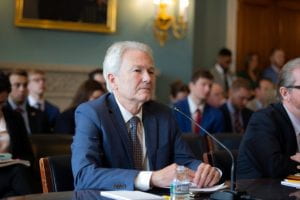
Reposted from the SIPS blog, Discovery that Connects [2019-06-14]. See also Cornell Chronicle article.
SIPS faculty member David Wolfetestified Wednesday to the U.S. House of Representatives Subcommittee on Biotechnology, Horticulture, and Research in a public hearing entitled, “Increasing Resiliency, Mitigating Risk: Examining the Research and Extension Needs of Producers”. Wolfe led the expert testimony by outlining challenges presented by recent extreme weather events and ways in which farmers are responding. He went on to list areas of need such as improved regional climate data, digital agriculture infrastructure, and greater access to capital.
The entire witness panel strongly emphasized the importance of public sector research to develop regionally adapted cultivars and address pest and pathogen challenges exacerbated by climate variability. Cooperative extension and collaborative research with USDA Agricultural Research Service (ARS) were also hailed. Followup questions from representatives covered topics as diverse as the benefits of gene editing, efficacy of cover crops to mitigate both flooding and drought, international competition in the realm of biotechnology, to concerns about the proposed move of USDA headquarters.
Other experts testifying at the hearing included Robert W. Godfrey, Director of the Agricultural Experiment Station at University of the Virgin Islands, Brise Tencer, Executive Director of the Organic Farming Research Foundation in Santa Cruz, CA, Sam Godwin of Godwin Family Orchard in Tonasket, WA, and Fred Gmitter of the Citrus Research and Education Center at the University of Florida.
Wolfe’s program in the SIPS Horticulture Section focuses on the accounting and management of carbon, nitrogen, and greenhouse gases in agroecosystems. He is also a project coordinator of the recently released New York Soil Health Roadmap.


